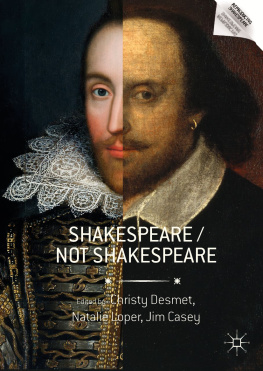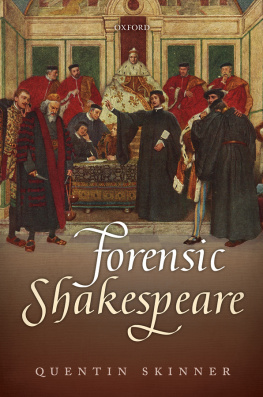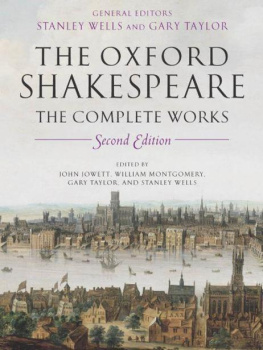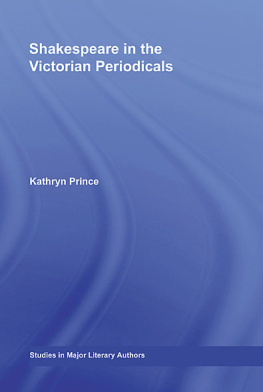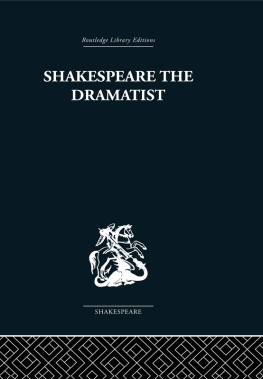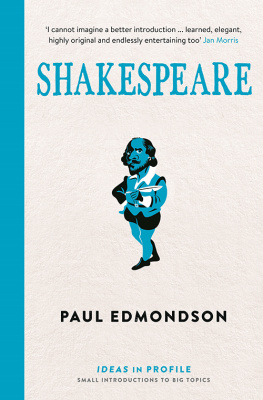1. Introduction
In April and May of 2010, the Royal Shakespeare Company and Mudlark Productions presented a version of Romeo and Juliet , entitled Such Tweet Sorrow , as a series of improvised, real-time tweets on Twitter that relied on the actors own words rather than Shakespeares. Of the three supposedly representative comments on the story posted on the BBCs website, only Lara from Bournemouth praised the idea, claiming the Tweetspeare performance breaks down this negative stereotype of Shakespeare as elitist when he was of the people and writing for the people; Elizabeth from Chicago, in contrast, called the experiment unacceptable and a travesty to the English language, while Nic from Manchester dismissed the performance as ridiculous and the biggest load of rubbish ever, arguing that This will make people who have never seen the play completely miss the actual excitement and beauty this play presents [] Shakespeare must be spinning in his grave. Such a negative reaction to this radical new-media adaptation of Shakespeare reveals that, despite some critics claims that we are in a putative post-fidelity moment (Lanier 27) in which the Shakespearean text is no longer considered sacred and no one obsesses over what is really Shakespeare, many potential consumers of the Bard still reject low art adaptations or performances that dramatically alter or abandon Shakespeares original. Richard Burt argues that issues of fidelity or questions of orismology rarely concern todays critics of Shakespeare and adaptation :
Now the distinction between authentic and inauthentic Shakespeares is not even made consistently, much less policed. Few academic critics want to ask anymore how Shakespearean a given adaptation of a given play is because we all know there is no authentic Shakespeare , no masterpiece against which the adaptation might be evaluated and interpreted. (17)
Outside academia, however, the distinction between authentic and inauthentic Shakespeares is made and policed on a daily basis, with readers and viewers continually claiming that a performance or adaptation is or is not really Shakespeare. But how are such judgments made? What is the scale? And where is the line? Adaptations such as Such Tweet Sorrow are declared travesties, while Justin Kurzels 2015 film version of Macbeth is praised by the Telegraph s Robbie Collin as possibly as good as Shakespeare on film gets, with cosmically powerful performances from Michael Fassbender and Marion Cotillard. Yet, as the Guardian s Peter Bradshaw notes, Kurtzels version of the film itself indulges in a number of interpretative flourish[es] while freely tinkering with the text . Thus, the film is lauded as an excellent version of Shakespeare even as it is acknowledged to be not quite Shakespeare.
This essay collection addresses the paradox that somethinga play, a film, an object, a storymay not merely resemble its corollary in the Shakespeare canon, but perhaps more puzzling, at once be and not be Shakespeare. This phenomenon can be a matter of perception rather than authorial intention (audiences may detect Shakespeare where the author disclaims him or may have difficulty finding him where he is named); it may equally be a product of intertextual and intermedial relations, processes that work on the level of semiotics and material substrate, apart from more overt processes of influence and reception. Gilles Deleuze and Flix Guattaris concept of artistic relations as rhizomes, a spreading, growing network that sprawls horizontally to defy hierarchies of origin and influence, is fundamental to this exploration, and many of the essays in the collection address the concept in exploring different examples from both high art and popular culture. Some essays examine the notion of artistic legitimacy by considering Shakespearean afterlives as acts of either creativity or what Michel de Certeau calls textual poaching (xii). Others discuss perceptions of Shakespeare in terms of cognitive gestalts , Shakespearean rabbit-ducks that fade in and out of recognition . Several essays explore the theoretical implications of Shakespearean adaptation , translation , and appropriation . Finally, some focus on Shakespearean ontology as an interplay between accidental and substantive variations in textual criticism .
What is at stake in confronting the binary opposition between what is and what is not Shakespeare? In Tales from Shakespeare , Graham Holderness reminisces that when I first read Shakespeare at school, the plays were firmly located within a set of contingent discourses marking out what was Shakespeare from what was not (ix). These discourses were scholarly and historical ones. How Shakespeare was used in popular culturefrom popular songs to advertisements for beerwas a whole different world, and the space between them seemed incapable of being bridged. Such is no longer the case if Holderness is correct that all of the basic activities constituting Shakespeare studiesscholarly editing; historical contexualization and analysis; critical and theoretical interpretation; creative adaptation exist in a continuum, and when compared, prove to be remarkably similar to one another (xi). One thrust of this volume is to see the realignment of Shakespearean binaries along a continuum as a robust project of multiplication and amplification: imagined through the spreading roots of a rhizome or network , the replication of memes and thickening of intertexts, fecund but unruly processes of spreading out through space. A second recognition prompted by the essays collected here is a renewed appreciation for the operations of chance and accident . In Tales from Shakespeare , Holderness favors the metaphor of the Large Hadron Collider of particle physics, which breaks down atoms into smaller constituent units to release creative energyand often, through that energy, produces new particles. The LHC creates in the act of destroying; accidental identifications of Shakespeare in artifacts previously accepted as not Shakespeare can be equally energizing. Writing about the concept of an accident in the early modern period, Michael Witmore proposes that accidents are some of the most luminous and enigmatic events (1), recognized by no less an authority than Aristotle s Poetics as particularly qualified to provoke wonder (2). Creative energy, surprise, wonderthese are the effects of appropriation as collision between what is and is not Shakespeare. In this case, examining (and enjoying) the line between what is and what is not Shakespeare becomes a crucial aspect of Shakespeare studies in general.
Adaptation, Appropriation, and Theory
As Christy Desmet and Sujata Iyengar s Appropriation , Adaptation , or What You Will argues, the theoretical premises that undergird our terminology are significant. Perhaps the most prominent current theory of Shakespearean adaptation is Douglas Lanier s Shakespearean rhizomatics , which co-opts Deleuze and Guattaris conceptual rhizomes and allows for multiple, non-hierarchical nodes of meaning and interpretation (rather than one centralized, hierarchical system of base and branches). In A Thousand Plateaus , Deleuze and Guattari propose the rhizome as an alternative to binary logic (associated with the hierarchical image of a tree and its roots) and circular, cyclic, or unified understanding (56). The authors examples of rhizomes include bulbs and tubers, crabgrass, potatoes, rats, burrows, ants, and even Amsterdam; all of these are constantly moving and evolving, creating and breaking connections, allowing for multiplicity and possibility rather than static understanding.

